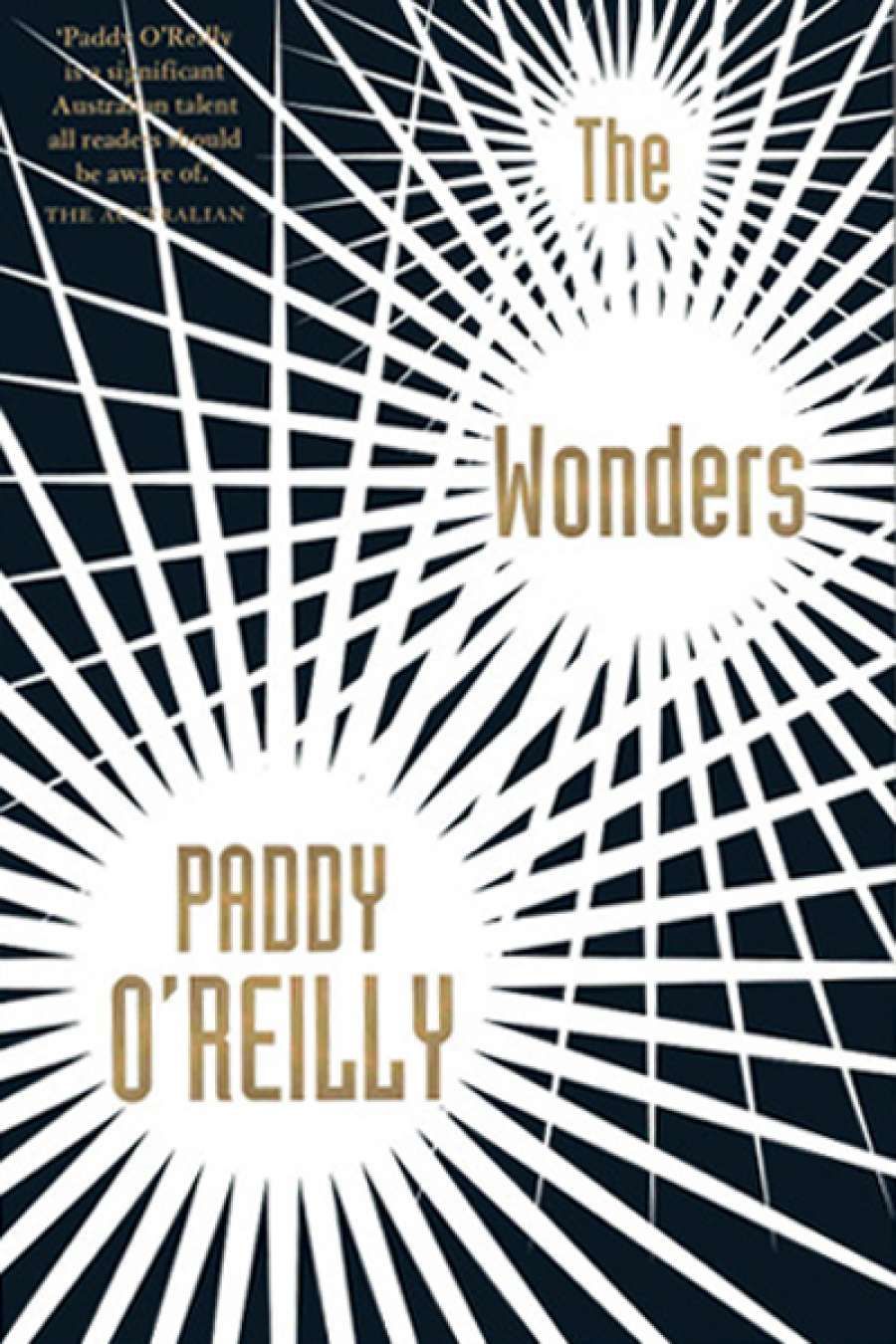
- Free Article: No
- Contents Category: Fiction
- Review Article: Yes
- Article Title: Faustian Wonders
- Online Only: No
- Custom Highlight Text:
A while ago, I was walking through Melbourne Central station when I was buffeted on all sides. Muscular minders were pushing back a crowd of jostling fans from a red carpet. Everyone was holding iPhones above their heads. They had come to see two Hollywood stars. But Hollywood is different these days. One star was playing a mutant who could grow adamantium claws from his hands. The other, an ordinary character, happened to be a dwarf.
- Book 1 Title: The Wonders
- Book 1 Biblio: Affirm Press, $29.99 pb, 301 pp
This is the profoundly disturbing territory Paddy O’Reilly explores in her bold and highly imaginative third novel, The Wonders. It is not altogether new ground: she is perhaps best known for her scintillating short stories, and one outstanding example in her collection The End of the World (2007) has a giant woman starring as a sideshow attraction.
O’Reilly’s three ‘wonders’ are not supernatural, but the creations of controversial modern medicine and technology. Leon, a young man with a constantly failing heart, is saved by a last-ditch procedure that grants him a mechanical brass heart clearly visible in his hollowed-out chest. Kathryn is also saved from disease, but the treatment leaves her body covered in wool: when it is shorn and styled, she becomes an amazing femme fatale. Christos is a performance artist who implants receptors for huge detachable wings on his back.
Despite the rational explanations, there is still something of the fairy tale about the trinity, or perhaps they recall Dorothy’s three friends in The Wizard of Oz: the scarecrow, the cowardly lion, and the tin man, with their comical failings and their yearning to find what they lack.
The Wonders’ only option is to become celebrities, and celebrities have to be minded and managed. Their minder–manager is Rhona, an American rhinestone-cowgirl type descended from circus royalty, with all the spin-doctoring skills of a P.T. Barnum for the modern age. Soon we sense a Faustian bargain. The Wonders will be kept in seclusion and luxury and will become very rich. In return, they must give performances – and what else?
O’Reilly keeps the sinister hints bubbling along nicely, and the story has the tension of a thriller. Will the audiences worship the Wonders, or turn on them? The stars bicker and throw tantrums in true celebrity fashion. Rhona speaks nostalgically of her days as a little girl in the circus, but we gather it was a cruel place, especially for the animals. In a poignant touch, former circus animals are now free to roam Rhona’s large and exclusive compound. One of them, August the bear, digs up a buried baton, twirls it, and curtseys. It was his life’s work, says Kathryn. He needs to perform.
Apprehension about the Wonders’ fate, however, is not going to work unless we care about each one, and O’Reilly works hard to bring us individuals who are not just the sum of their oddities. The story is told from Leon’s point of view: even before his heart trouble, he was a timid and introspective soul who sought to learn everything from self-help books, and for all his physical and emotional fragility, the reader occasionally yearns to knock a little sense into him.
Leon doesn’t expect much from life, especially from women; but with his new heart, he will gradually discover courage, love, and an appreciation of the everyday wonders of the world. Or so we hope. Meanwhile, he is fascinated by sexy, woolly Kathryn, a tough Irish girl from the slums, already exploited and abused by her husband. She is the most vividly realised Wonder, with her penchant for dramatic capes and sassy shoes. I can see her strutting the stage.
Despite my moments of impatience with Leon, I warmed to these two; only Christos didn’t quite come alive for me. He is the odd one out, a Wonder who has chosen to be the way he is; I was never quite sure why he didn’t resist Rhona’s wooing and stay on his own, continuing to use his body to express his art.
It also strained belief that the Wonders could be kept safe from prying eyes for so long, in these days of zoom lenses, satellite photographs, and YouTube sensations. However, these are not serious objections to a tale that teases and amuses and distresses the reader in turns.
I am resisting the urge to interpret the story as a parable for our times and our cults. It works best when the meanings stay a little fuzzy. We know it is about humanity, even as the Wonders and their admirers deliberately stretch the definition of what it is to be human, until we fear something will snap. That recognition and that fear kept me engrossed to the final elegiac quotation from William Blake, another celebrator of wonders. Long after the book was closed, the Wonders continued to haunt me.


Comments powered by CComment